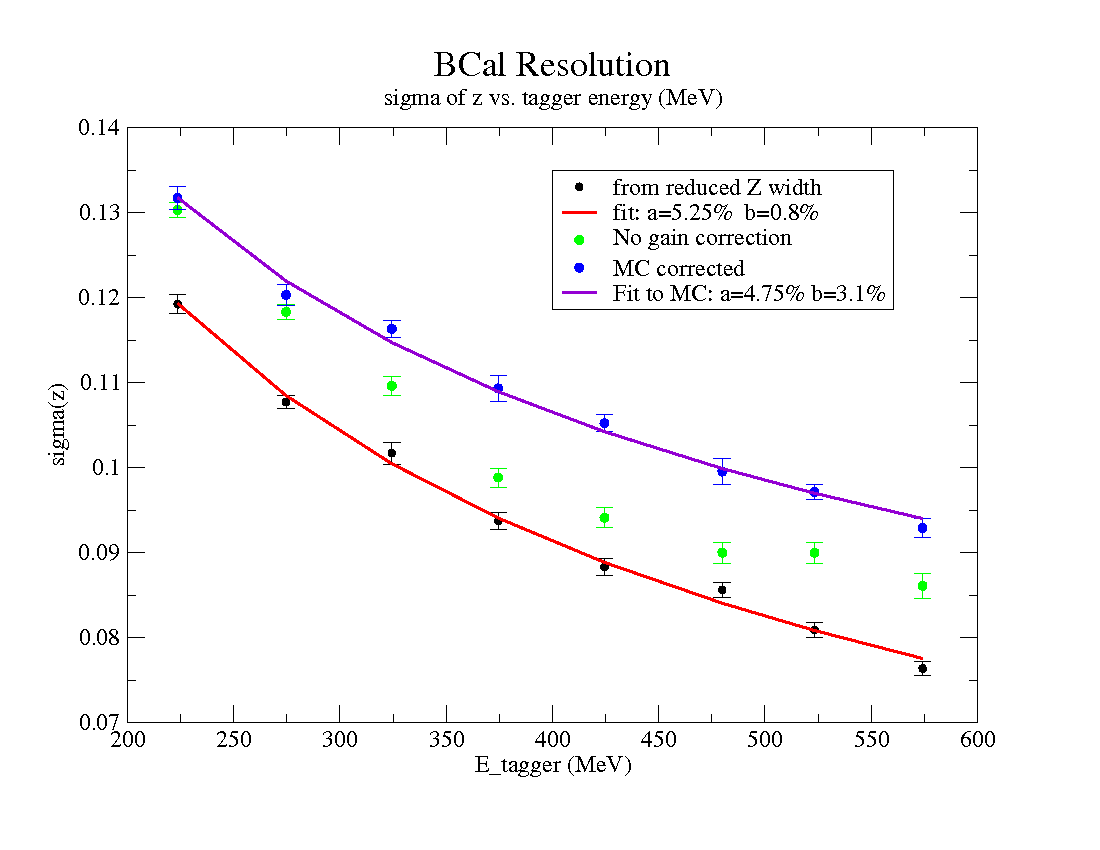Difference between revisions of "BCal Beam Test Plots, January 3, 2007"
| Line 5: | Line 5: | ||
You can find the [[peakfit.C]] code here. ( in ROOT > .x peakfit.C ) | You can find the [[peakfit.C]] code here. ( in ROOT > .x peakfit.C ) | ||
| − | The code goes through and adjusts each gain correction factor by an amount epsilon ( set at 0.01 now) until sigma is minimal. Of course the ADC conversion factor (E_beam/E_cal) has to be calculated each time too. | + | The code goes through and adjusts each gain correction factor by an amount epsilon ( set at 0.01 now) until sigma is minimal. Of course the ADC conversion factor (E_beam/E_cal) has to be calculated each time too. I've run it twice at two different Ephoton binnings to see if there was any drastic difference in the gain factors. There wasn't. |
| − | The fit is using <math> \sigma_{z} = \frac{a}{\sqrt{E(GeV)}} + b </math> in the package xmgrace. | + | * The gain correction factors come out to be |
| + | n1 1.01 s1 1.00 | ||
| + | n2 1.00 s2 1.02 | ||
| + | n3 1.04 s3 1.02 | ||
| + | n4 0.98 s4 0.98 | ||
| + | n5 0.98 s5 0.98 | ||
| + | n6 0.99 s6 1.01 | ||
| + | n7 0.99 s7 0.98 | ||
| + | '''n8 0.79 s8 0.68''' | ||
| + | n9 1.04 s9 1.04 | ||
| + | n10 0.99 s10 1.11 | ||
| + | n11 1.03 s11 0.97 | ||
| + | n12 1.00 s12 1.05 | ||
| + | n13 1.04 s13 0.99 | ||
| + | n14 0.93 s14 1.04 | ||
| + | n15 0.92 s15 0.99 | ||
| + | n16 1.03 s16 1.04 | ||
| + | n17 1.03 s17 1.03 | ||
| + | n18 0.97 s18 1.02 | ||
| + | |||
| + | and the mean of E_beam/E_cal = 0.219 | ||
| + | |||
| + | |||
| + | |||
| + | Doing this shows a good improvement in the "floor term" and the energy dependent term is still approximately 5%. The fit is using <math> \sigma_{z} = \frac{a}{\sqrt{E(GeV)}} + b </math> in the package xmgrace. | ||
[[Image:Bcalres.gif]] | [[Image:Bcalres.gif]] | ||
Revision as of 16:47, 3 January 2007
From suggestions from Alex and others I wrote a piece of code that runs in ROOT that plots z finds sigma and then adjusts the PMT gain correction factors until the sigma of the gaussian fit is at it's minimum. Z is defined as
You can find the peakfit.C code here. ( in ROOT > .x peakfit.C )
The code goes through and adjusts each gain correction factor by an amount epsilon ( set at 0.01 now) until sigma is minimal. Of course the ADC conversion factor (E_beam/E_cal) has to be calculated each time too. I've run it twice at two different Ephoton binnings to see if there was any drastic difference in the gain factors. There wasn't.
- The gain correction factors come out to be
n1 1.01 s1 1.00 n2 1.00 s2 1.02 n3 1.04 s3 1.02 n4 0.98 s4 0.98 n5 0.98 s5 0.98 n6 0.99 s6 1.01 n7 0.99 s7 0.98 n8 0.79 s8 0.68 n9 1.04 s9 1.04 n10 0.99 s10 1.11 n11 1.03 s11 0.97 n12 1.00 s12 1.05 n13 1.04 s13 0.99 n14 0.93 s14 1.04 n15 0.92 s15 0.99 n16 1.03 s16 1.04 n17 1.03 s17 1.03 n18 0.97 s18 1.02
and the mean of E_beam/E_cal = 0.219
Doing this shows a good improvement in the "floor term" and the energy dependent term is still approximately 5%. The fit is using  in the package xmgrace.
in the package xmgrace.

